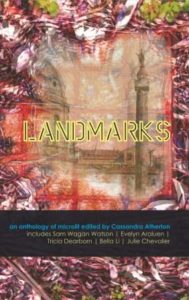 This week we talk to Gavin Austin about his piece ‘My Mother’s Song’ which appears in Landmarks, the latest anthology curated by Spineless Wonders. During this interview we discover Gavin’s favourite Australian landscape, who inspires his writing and what inspired his micro-lit ‘My Mother’s Song’.
This week we talk to Gavin Austin about his piece ‘My Mother’s Song’ which appears in Landmarks, the latest anthology curated by Spineless Wonders. During this interview we discover Gavin’s favourite Australian landscape, who inspires his writing and what inspired his micro-lit ‘My Mother’s Song’.
Tell us about a landmark that is significant to you
There have been many landmark events throughout my life. My earliest memory is of sitting on my maternal grandfather’s knee listening to his stories. He did not read tales from a book but invented his own, with my pets and my friends woven into the plots. I would like to think I may have inherited some of his bountiful imagination.
Many years ago I was fortunate to meet Australian author, Jack Radley, who took an interest in my writing. He became my mentor and, with his help and encouragement, I was able to muster the courage to submit work for competition and publication. It was his push that took me from a private scribbler to offering up my writing to the public domain.
However, the most recent landmark has been a diagnosis of cancer and subsequent radical surgery. It may be a cliché, but the wait on scans and pathology reports does make one reassess one’s situation in life and perhaps there is a surprising shift in values. I am hoping to find a positive in this latest situation and harness the emotion and contemplative experience to bring to my writing.
What inspired you to write ‘My Mother’s Song’?
It struck me that music and songs (and the arts in general) are very much a part of our lives – perhaps without us realising so – to honour landmarks through life’s journey. We celebrate a birthday with song; we have our ‘special’ songs – love songs/break-up songs. There are even funeral songs that we choose to be remembered with.
In writing ‘My Mother’s Song’ I sought to explore the journey from mother and care-giver to being the cared for. The mother once bathed her child, perhaps singing nursery rhymes, and now at the end of her life – as her ‘song’ is concluding – it is the child bathing the mother in a tragic landmark event as the roles are reversed.
How do you find the experience of writing to a theme?
I usually have no trouble with writing to a theme once an idea to explore has sparked in my mind. Keeping the work within the word limit is the real challenge – preserving enough detail for the work to be visual and yet not superfluous. And trusting what can be left unsaid for the reader to interpret and colour with their individual thoughts and experiences.

Describe your writing space
I have two different approaches to writing. When I write poetry I tend to sit by the water in my nearby bayside park and scratch out ideas and rough drafts with pen and paper. I also love to escape the city when I can to stay with my friends in the country. It stirs my childhood memories and I draw inspiration from the smell of eucalypts and the feel of earth beneath my feet.
If I am writing fiction, I have trained myself to write at the keyboard of my laptop, on a desk in the corner of the bedroom, while facing a blank wall. This was the process for writing ‘My Mother’s Song.’ I always have my special background music playing, and a mug of green tea within reach.
Tell us about a writer or work that has inspired you as a writer
My Year 11 Literature class introduced me to Tess of the d’Urbervilles by Thomas Hardy. It was Hardy’s approach of detail to setting I especially admired. I was in awe of Hardy bringing richness to his writing by taking the time for those poetic descriptions of his Wessex. I found he brought a real sense of place to the story.
Now, as a writer, I endeavour to ‘drop’ my reader right into the setting and situation of the writing, ready to experience the action first hand. I also try to engage the other senses apart from sight – I believe taste, smell and sound all bring vibrancy and texture to the work.
Gavin Austin was born in South-East Gippsland, Victoria, but now calls Elizabeth Bay in Sydney his home. Gavin writes mostly short fiction, free verse, Japanese genre poetry, and short plays. His work has been published in many Australian journals and anthologies, been broadcast on Australian Community Radio, produced for several play festivals, and he has been successful in numerous writing competitions. Gavin’s writing has also appeared in literary publications in NZ, the USA and the UK. He is currently putting together a collection of Japanese short form poetry.
Feature image via Creative Commons

